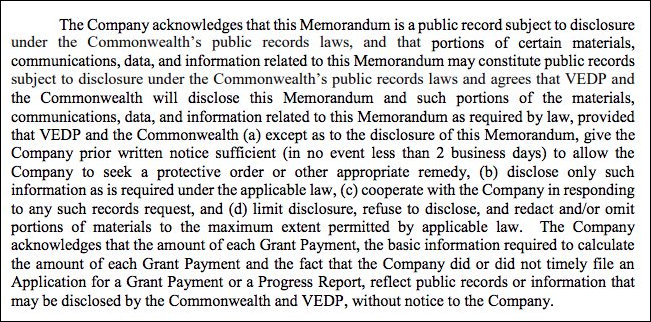The Commonwealth of Virginia has set new standards of transparency in disclosing the details of its agreement with Amazon, Inc., to build a massive new facility in Arlington and Alexandria with some $2.5 billion in public inducements. But there may be limits to that transparency.
Benjamin Freed, technology editor of State Scoop, tweeted yesterday that the Virginia-Amazon agreement grants Amazon a big exemption from the Freedom of Information Act. He cited the following passage:
The Company acknowledges that this Memorandum is a public record subject to disclosure under the Commonwealth’s public records laws, and that portions of certain materials, communications, data, and information related to this Memorandum may constitute public records subject to disclosure under the Commonwealth’s public records laws and agrees that [the Virginia Economic Development Partnership] and the Commonwealth will disclose this Memorandum. … (a) except as to the disclosure of this Memorandum, give the Company prior written notice sufficient (in no less than 2 business days) to allow the Company to seek a protective order or other appropriate remedy. …
Furthermore, VEDP and the Commonwealth will “(c) cooperate with the Company in responding to any such records request, and (d) limit disclosure, refuse to disclose, and redact and/or omit portions of materials to the maximum extent permitted by applicable law.”
“How is it justified that Richmond will be protecting a private company from governmental transparency?” asks Ken Stiles, who brought Freed’s tweet to my attention.
Good question. I can presume only that the exemption was granted to protect Amazon’s proprietary business information. Respecting the confidentiality of proprietary information is standard practice in the economic development profession. Without such guarantees, business enterprises might refuse to do business. In this instance, it appears that state officials actually extracted a concession from Amazon — the company must go to court within two days and file an injunction. In other words, the company must persuade a judge that it would suffer damage from the release of information.
My understanding is that proprietary data from companies involved in economic-development deals normally aren’t subject to FOIA at all, under any circumstances. The magnitude of the Amazon deal — some $2.5 billion in public funds — may warrant a different standard. I invite readers to weigh in on whether the concession written into the Virginia-Amazon agreement sufficiently protects the public interest.
Update: Megan Rhyne, executive director of the Virginia Coalition for Open Government, argues in The Virginia Mercury that the agreement represents a step backwards for transparency. The MOU not only protects Amazon’s proprietary information, but the two-day heads up to Amazon in FOIA filings represents a concession to Amazon, not a concession from Amazon.



